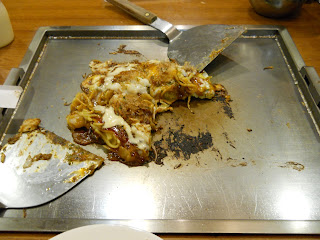The way to make more DNA from a single cell is to perform whole genome amplification. Each time a cell divides, it performs essentially whole genome amplification to ensure that the newly made cell has its own genome. This whole genome amplification takes place within the cell using its own suite of enzymes. We have to perform a whole genome amplification in a tube where the entire contents of the cell have been spilled out.
Currently, the best way to do whole genome amplification in a tube is by using the enzyme Phi29 DNA polymerase. A DNA polymerase is an enzyme that makes more DNA. Phi29 is a specific DNA polymerase that replicates by a process called strand displacement.
 | |
| http://en.wikipedia.org/wiki/File:MDA_reaction_1.JPG |
In strand displacement, random primers tell the polymerase where to begin making DNA. The polymerase amplifies DNA for about 7 to 10 kb or until reaching a previously amplified region. When the polymerase hits this previously amplified region, it actually displaces it and continues to make more DNA. Meanwhile, new primers and new polymerases can begin amplifying DNA using either the original DNA or the newly replicated DNA. The result is the branching network of DNA molecules shown in the picture above.
The advantage of strand displacement is that it does a better job of replicating the entire genome uniformly and to high copy number than other amplification methods.
At the very end of the entire process, all of the branching molecules are cut so that only linear molecules remain. These molecules are then ready for DNA analysis!
FOOD!
 |
| Kinmedai (golden eye snapper) |
 |
| Squid ink noodles |
 |
| Modanyaki (savory pancake with noodles) |
 |
| Sashimi |
 |
| Mont blanc (chestnut cream dessert) |
Great post! Thanks a lot for sharing this information. Cheers!
ReplyDeletephi29